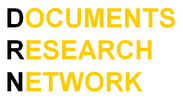Aimee GrantI’ve had a long-standing interest in using documents as data. However, it has taken me several years to fully explore the potential within documents that I have collected as part of research projects. For example, I can now see that within my PhD thesis (Grant, 2011), I did not undertake a reflexive and critical enough view when working with NHS patient files to fully explore their meanings.
In recent years, I have also been able to move beyond more quantitative, content analysis based, approaches, see for example Grant (2015), into a consideration of more discourse related analysis strategies, for example Grant (2016) where I undertook further analysis of the data within Grant (2015). Over the past three years, I have returned to critically interrogate the documents collected as part of my doctoral studies alongside observational and interview data collected. In doing so, and in undertaking new projects using documents as data (Grant & Hoyle, 2017; Grant, Mannay, & Marzella, 2017; Grant & O’Mahoney, 2016; Meek, Hurt, & Grant, 2015) I have grown increasingly confident in understanding how projects which use documents as data should be designed, including elements such as sampling, data quality and analysis techniques. Whenever I have presented my research using documents as data, I have mostly had small to moderate sized audiences, but they were very engaged and hoping to learn methodological lessons that they could apply to their own work, such as at the British Sociological Association medical sociology conference 2016. As a result of this, I have written a case study with an accompanying practice data set for the SAGE Research Methods Platform guide on undertaking critical discourse analysis with documents (Grant, 2017). I am further addressing this gap through writing an accessible ‘how to guide’ for research involving documents, to be published by Routledge in 2018 (Grant, 2018). In March 2017, I presented a draft of a methods paper I am preparing for peer review, based on an expanded analysis of the documents in my doctoral research, to the ethnography research group at Cardiff University. In the audience, there were many PhD students and early career researchers who wanted additional guidance on how to use the documents that they had collected. I decided that it was time to bring together a research network. I had already previously written a small advert in the British Sociological Association Network Magazine for those with an interest in using documents as data to contact me, in order to set up a BSA special interest group. However, discussion following the ethnography group highlighted the interdisciplinary nature of these challenges. As such, I decided that an independent network would be most beneficial, and I asked Dr George Jennings, a researcher with a wide range of experience in using documents as data, to co-convene the network with me. We hope that you find the network useful in your research. References Grant, A. (2011). New Labour, Welfare Reform and Conditionality: Pathways to Work for Incapacity Benefit Claimants. Phd thesis: Cardiff University. Grant, A. (2015). “#discrimination”: the online response to a case of a breastfeeding mother being ejected from a UK retail premises. Journal of Human Lactation, 32(1), 141–151. https://doi.org/10.1177/0890334415592403 Grant, A. (2016). “I… don’t want to see you flashing your bits around”: Exhibitionism, othering and good motherhood in perceptions of public breastfeeding. Geoforum, 71(May 2016), 52–61. Grant, A. (2017). Analysing online news comments using critical discourse analysis. SAGE Research Methods Platform. https://doi.org/10.4135/9781473999138 Grant, A. (2018). Doing EXCELLENT social research with documents: Practical examples and guidance for qualitative researchers. Abingdon: Routledge. Grant, A., & Hoyle, L. (2017). Print media representations of United Kingdom Accident and Emergency treatment targets: winter 2014-15. Journal of Clinical Nursing. https://doi.org/10.1111/jocn.13772 Grant, A., Mannay, D., & Marzella, R. (2017). “People try and police your behaviour”: the impact of surveillance on mothers’ and grandmothers’ perceptions and experiences of infant feeding. Families, Relationships and Societies. Grant, A., & O’Mahoney, H. (2016). The portrayal of waterpipe (shisha, hookah, nargile) smoking on Twitter: a qualitative exploration. Public Health. Meek, A., Hurt, L., & Grant, A. (2015). An Independent Evaluation of The Filter. Cardiff: ASH Wales.
0 Comments
Leave a Reply. |
AuthorMembers of the Documents Research Network Archives
June 2019
Categories |

 RSS Feed
RSS Feed
